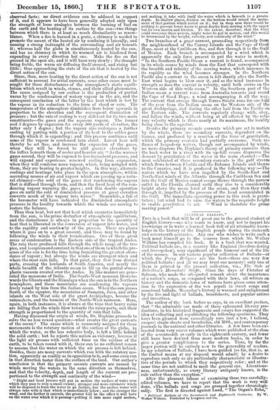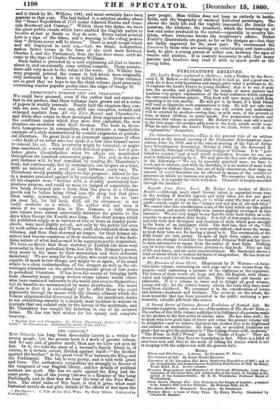POLITICAL BALLADS.*
Tuts is a book that will be of great use to the general student of English history—one who reads to know, and not to impart his knowledge or to write a learned book full of all attainable know- ledge in the history of the English people during the sixteenth and seventeenth centuries. Any one who wishes to write such a book must himself go to the sources from which Mr. Walker Wilkins has compiled his book. It is a book that was wanted. Political ballads are, in a country like England (freedom-loving and free-spoken), very significant of the humour and of the life of the masses. In our various popular collection of Ballads—of which the Percy Relives are the best—there are very few political ballads ; and (if we may trust our memory) only one of them is printed in the present collection, viz., The Sale of' _Rebellion's Household &up. Since the days of Fletcher of Saltoun, who made the oft-quoted remark about the importance of a nation's songs, as compared with their laws, all writers on history and the domestic loves of nations have given some atten- tion to the expression of the vox populi in street songs and occasional ballads. Macaulay's history is warmed and enlightened by the fire and light of ballads, broadsheets, and popular satires and invectives.
The author of the book before us says, in an excellent preface, that " the admirable use made of these ephemeral literary pro- ductions, in his historical fragments and essays has suggested the idea of collecting and republishing the following specimens. They have been gleaned from exceedingly rare (not a few, I believe, unique) single sheets and broadsides, old MSS., and contemporary journals in the national and other libraries. A few have been ex- tracted from very scarce volumes which were published at the close of the seventeenth or early in the eighteenth century, and fewer still have been derived from more modern books, in order to give a greater completeness to the series. Thus, by far the larger portion will be entirely new to the generality of readers. In my selection of Ballads, I have been guided (so far, that is, as the limited means at my disposal would admit) by a desire to
reproduce such only as are particularly characteristic or illustra- tive of the periods to which they respectively refer ; and at the same time are not unfitted to meet the general eye. Licentious- ness, unfortunately, as every literary antiquary knows, is the rule rather than the exception."
After the pleasant labour of examining these two carefully- edited volumes, we have to report that the work is very well done. -The ballads and songs are grouped together chronologi- cally. The first is directed against Laud, "The Organ's Echo,' • Political Ballads of the Seventeenth and Eighteenth Centuries. 13y W. Walker Wilkins. Published by Longman and Co. and is dated by Mr. Wilkins, 1841, and must certainly have been popular in that year. The last ballad is a satirical medley about the "Secret Expedition of 1757 under Admiral Hawke and Gene- rals Mordaunt and Conway." Within these two dates, we have the great public events which have enabled the English nation to breathe at last as freely as they do now. Every ballad printed here is a sign of the times, and a warning to the ruling powers that " Britons never will be slaves." There is much rough talent and wit displayed in each era,—but, we think, indignation makes better verses in the time of the civil wars between Charles I. and the Parliament, than she has done since, until we come to the time of Charles Hantwry Williams.
Each ballad is preceded by a note explaining all that is known about it, and occasionally some critical remarks. These annota- tions add very much to the value of the work. Mr. Wilkins has very properly printed the names in full which were originally only indicated by a blank or by initial letters. These volumes are so good that we hope to see the third volume (half promised) containing similar popular poetry since the reign of George H.



























 Previous page
Previous page